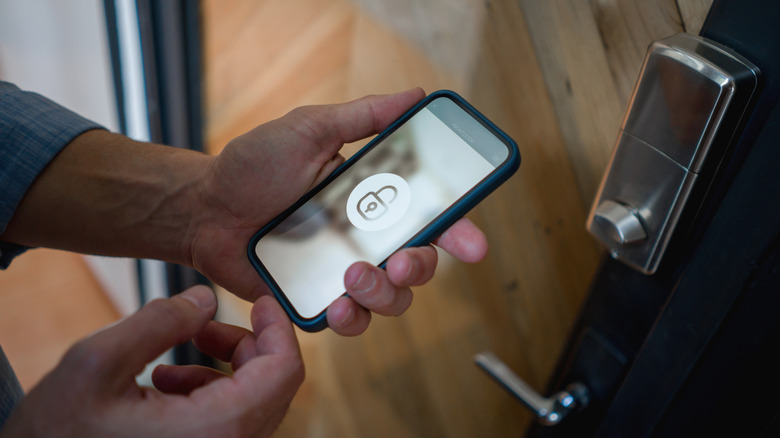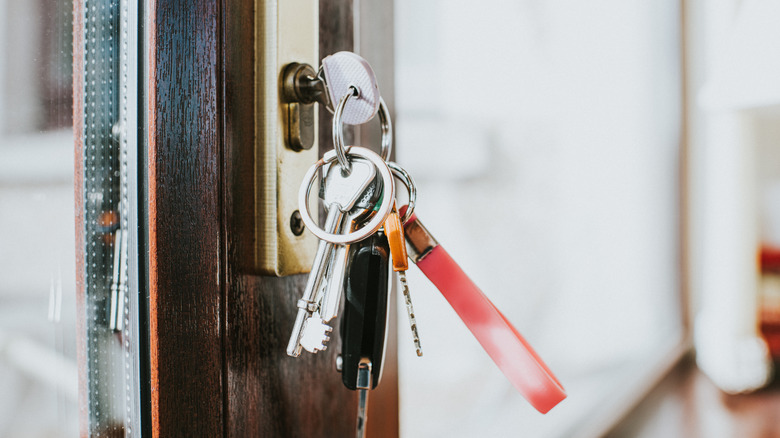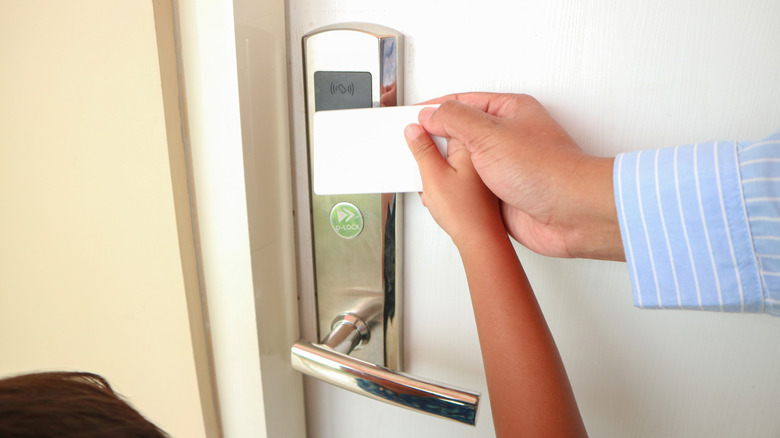Are Keyless Door Locks Actually Secure?
Convenience is the greatest selling point of a keyless door lock, as keyless entry allows you and your family to come and go without the panic of forgotten keys or wondering if you locked the door. That convenience might come at the expense of safety, however. Smart technology, like keyless entry, is becoming the norm in modern society, but it's not without its faults. The cons include the risk of power outages and hacking, which can compromise your security.
Keyless entry encompasses a broad range of different locks. The most economical is a code-based keyless lock, which unlocks a deadbolt when the correct numeric code is entered into the lock's keypad. Frequent travelers will recognize the card or fob-based lock, which is commonly utilized in hotels as well as offices and some apartment buildings. Biometric locks are things of the science fiction future — locks that are keyed to a person's fingerprint, voice, or retinal pattern. Finally, for those willing to invest significant capital into home security, there is the smart lock, which connects to your Wi-Fi, allowing you to control it from a distance using an app on your smartphone. Before replacing the locks on your doors, you should consider the pros and cons of keyless entry, and whether it is right for you, your home, and your family.
The pros of keyless door looks (and what to look for)
If you're shopping around for a keyless entry system, you might feel overwhelmed by the available options. Keyless entry can be a safer alternative to traditional mechanical locks, but only if you choose the right lock for your home and lifestyle. A code-based lock with keypad entry offers increased flexibility for those who have many people entering and leaving a home, as a temporary code can be given to cleaning professionals, babysitters, or visiting extended family. Biometric scanners give you more control of the people who can access your home, and many have keypads as backup if you're unable or unwilling to add a new fingerprint to the system. While the most expensive, a smart lock is also the most convenient, since you can monitor your home from a distance. This is especially helpful if you want to keep an eye on a temporary rental or vacation home or if you are often out of town.
Choosing the best lock for your front door can be difficult, but focus on one that matches your needs and that offers a backup key for emergencies. In the case of locks, material matters — choose a model that is made of a durable metal, not plastic. Professional installation will also give you an added peace of mind, as a professional can ensure the proper security measures are followed.
The cons and how to mitigate them
All keyless entry systems present the same vulnerabilities as any other piece of technology. Like any machine, these locks are vulnerable to power outages, especially if the lock operates by connecting to a home's Wi-Fi — if anything happens to the Wi-Fi, the door is also affected. When looking for a lock, make sure it has an offline mode and battery power backup in case the power grid becomes unreliable.
Keyless entry systems are also vulnerable to hacking, but this vulnerability can be compensated for with two-factor authentication. Encryption-protected locks also offer an added level of digital security. If your lock utilizes any software, it is important to keep that software up to date, and you should regularly change codes to avoid security breaches. A good keyless entry system will offer a physical key as a backup in case the electronic features are unavailable, but this still leaves you carrying around a key. Not all smart locks are worth the hype, and keyless entry might not suit your lifestyle or preferences, but it can be a great option for those looking to increase their security options.


